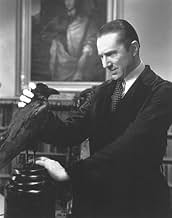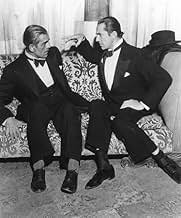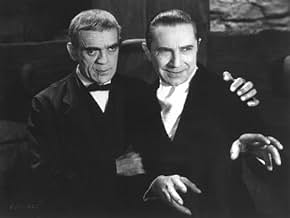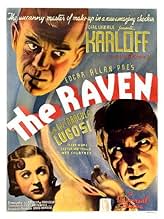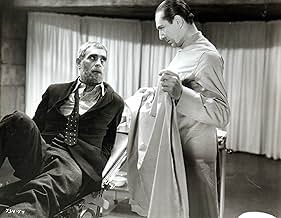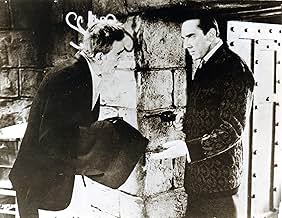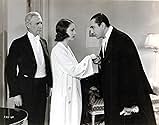Dr. Vollin ist ein brillanter, aber instabiler Chirurg. Er rettet das Leben von Jean Thatcher, einer schönen jungen Sozialitin, die bei einem Autounfall verletzt wurde und sich zunehmend zu ... Alles lesenDr. Vollin ist ein brillanter, aber instabiler Chirurg. Er rettet das Leben von Jean Thatcher, einer schönen jungen Sozialitin, die bei einem Autounfall verletzt wurde und sich zunehmend zu ihr hingezogen fühlt.Dr. Vollin ist ein brillanter, aber instabiler Chirurg. Er rettet das Leben von Jean Thatcher, einer schönen jungen Sozialitin, die bei einem Autounfall verletzt wurde und sich zunehmend zu ihr hingezogen fühlt.
- Edmond Bateman
- (as Karloff)
- Dr. Richard Vollin
- (as Lugosi, Bela Lugosi)
- Autograph Hound
- (Gelöschte Szenen)
- Autograph Hound
- (Gelöschte Szenen)
- Drug Clerk
- (Gelöschte Szenen)
- Autograph Hound
- (Gelöschte Szenen)
- Actor reading 'The Raven'
- (Nicht genannt)
- The Crook
- (Nicht genannt)
- Dancer
- (Nicht genannt)
- Bedside Dr. at Jerry's Right
- (Nicht genannt)
- Chapman - Buyer of Poe Memorabilia
- (Nicht genannt)
Empfohlene Bewertungen
Lugosi was a better actor than he usually gets credit for being; his downfall seemed to stem from a lack of selectivity about what projects he accepted, frequently landing him in dreck. THE RAVEN gives him ample opportunities to shine, and he makes the most of them. Some consider his work here over-the-top, but scenery-chewing is entirely appropriate to the character, who is written as an arrogant egomaniac - he refers to himself as "a law unto myself" and even "a god" - and probably the only out-and-out lunatic Lugosi ever played. The desires or welfare of others simply don't enter into the equation for Vollin. After repeated refusals to perform Jean's operation, only an appeal to his ego ("So, they DO say I am the only one!") can induce him; that the object of his affection makes no secret of her love for someone else is of no consequence to him, and for the one "nice" deed he does for someone else - making Jean's fiancé his research assistant - he flatters himself that he's being magnanimous, though his true motivation, keeping the young rival too busy to interfere with his pursuit of Jean, is nonetheless self-serving.
The gloriously unrestrained nature of his performance notwithstanding, he gives us some of his best moments here: when he finds himself in Karloff's clutches, totally helpless and at Boris' mercy, the panic beneath his thin veneer of casual bravado is palpable. Likewise the barely-controlled fury and pain when, ostensibly speaking about Poe, he tells of the madness that grips "a man of genius denied of his great love," and how that madness can drive him to conceive of "torture....torture for those who have tortured him." His perverse glee in inflicting that torture is chilling, and he even displays some unexpectedly dry wit. When Vollin demands of Jean's father, Judge Thatcher, "There are no two ways; send her to me," the Judge gasps an incredulous "Do you know what you're saying?" Lugosi, in a deliberate monotone, answers the question literally; repeating, "There - are - no - two - ways - send - her - to - me!"
If I've put the emphasis here on Lugosi, it's because he truly dominates all around him, including Karloff. That's no reflection on Boris; he just plays a mostly passive character: Edmond Bateman, bank robber and escaped con, who seeks Vollin out for an operation to make him "look different." Given the shady-looking hood who passes Vollin's name and address to Bateman, and the seedy surroundings in which the meeting takes place, one can't help but wonder at Vollin's social contacts, and the kind of services he's previously solicited (or performed). The unfortunate Bateman soon finds himself in over his head, the victim of Vollin's particularly sadistic blackmail.
As with Frankenstein's creation, Boris suffuses Bateman with pathos. "I don't want to do them things no more," he pleads, when Lugosi sets out to enlist his help for some dastardly deeds. Because of his predicament, we can feel sympathy for Bateman, even as he does more of "them things" at Vollin's behest. Under heavy and restricting makeup, as was often the case, Boris is able to communicate a great deal with his eyes (or, in this case, eye). Watch the excitement in them (it?) as Lugosi removes the post-op bandages; your heart fairly breaks because you know the shock that's in store for him.
The supporting cast is filled out with familiar and capable players such as Inez Courtney and Ian Wolfe (who has one of the film's best lines when, as Bela goes on his torture rampage, protests with an oh-so-civilized, "See here, Vollin, things like this can't be done!").
The ever-dependable and versatile Samuel S. Hinds provides us with one of his delightfully stodgy curmudgeons as Judge Thatcher, and he deserves a special nod on general principle. Hinds was one of those "oh, I've seen him a hundred times before" actors (whose face is probably known by far more people than his name) who, during the '30's and '40's, seemed to pop up in every third film released. His persona varied little (and he seemed doomed to rarely being cast as anything besides judge, doctor or lawyer), but he was able to bend it in whatever direction a role required, enabling him to move with ease from the tight-ass Thatcher to Slade, the corrupt, tobacco-spittin' judge in "Destry Rides Again," to the sage and kindly family physician in "The Boy With Green Hair." Too bad he never did a "Huck Finn;" he'd have been great as The King.
Despite the improbability (oh, all right; absurdity) of the plot, the script provides some wonderful dialogue. Hinds has the great good fortune of uttering the catchy phrase, "stark-staring mad" on more than one occasion. But the delivery of even the pithiest exchanges, such as "'You monster, you like to torture.' 'Yes, I like to torture.'" gives them a vitality far beyond what is on the page. When all is said and done, though, THE RAVEN is, above all, B & B's show. Each is at the top of his game, and together, they own it.
"The Raven" is a pretty good BW horror film that truly delivers the goods even though it's not particularly grand or inventive. It holds a fairly entertaining if rather routine narrative of clichés (stormy night in strange house). Though, you can't go wrong with a stormy night in a horror film. Saying that, it's the evoking presence of Karloff and Lugosi when on screen that makes it a great spectacle as there performances overshadow the rather foreseeable material or plot. For a mostly talkative film it doesn't have a sluggish feel and it moves at a rather brisk pace.
It had a ludicrous plot with some far-fetched scenario's (A quick recovery after surgery) and unintentionally humorous moments. After a real talkative first half about these amusing Poe torture designs we get to see them finally in use. It's too bad he used them towards the end, as not much torturing did happen, but mostly talk of these devices. Though, when it did happen there was a lot of imagination and interesting ideas. This is when the sudden thrills pick up in the last 20-mintues and it suddenly gets quite claustrophobic further along the film goes. In which Dr. Vollin really tightens the screws in some energetic and upbeat scenes. These scenes aren't terribly suspenseful, but the confrontations between Bateman and Vollin are vibrantly compelling and the devices achieve such a horrific mood. The climax is rather grand too. The ending was rather sudden and you can say lame for my liking. Dialogue was a mix bad with some engaging dialogue from the leads coming across as poetic and other times it was rather stilted or just plain corny.
A rather enforcing and roaring music score surrounds and captures the terror superbly. The film is well shot and is very atmospheric indeed. There is such great use of shadow and lighting composition in the mansion and a superb layout of the dungeon with its torture devices. The storm helps the atmosphere to be effective too. Karloff's character with the disfiguring is treated with decent make-up effects and it really does keep you glued at staring at it.
Rather mundane performances from the cast except for the two strong central leads and maybe with the exception of Samuel S. Hinds as Judge Thatcher. It's definitely one of Lugosi's best performances as the sadistic Dr. Vollin. Lugosi gives us his usual evil grimaces and at times goes over-the-top in delivering the dialogue. While Borris Karloff gives a solid performance, but I wouldn't class it as one of his greatest. He shines as the demented criminal Edmond Bateman who's lurking around the house with great effect.
For me it was a competent shocker that holds some unforgettable scenes and performances.
Lugosi's role in this one is much larger than Karloff's, and Bela carries most of the story. His theatrical style is quite appropriate in the role of Dr. Vollin, making for an entertaining yet genuinely dangerous foe. When Lugosi is in good form, he can make the most ridiculous dialogue come out right. Both the story and dialogue here would indeed collapse under the most basic logical analysis, and Lugosi's showmanship is one of the reasons why much of it works anyway.
While Karloff has a smaller role, he also does a good job, and indeed the movie would not have worked very well without Karloff's efforts in making Bateman pathetic and unheroic, yet human and understandable. The rest of the cast have fewer opportunities, yet the roles are filled by good character players who all do their jobs well.
The consensus, namely that "The Raven" is a cut below the previous year's Boris/Bela collaboration "The Black Cat", seems accurate. Yet "The Raven" in itself is a solid and usually entertaining feature.
Running at just over one hour, The Raven simmers nicely as the characters form, and then boils to the surface for the furious last quarter. In the build up we have been royally treated to some truly excellent scenes as Vollin steadily grows more deranged. The unmasking of Bateman post surgery is unnerving, and thanks to Karloff's ability at making a criminal sympathetic, heartfelt. This is followed by a mirror sequence that is a horror highlight of the 30s and puts us in no doubt that Vollin is a terrifying creation. The creepy house setting is naturally a horror staple but one can't help wondering what a better director than Lew Landers could have made with the simple but effective premise? It's solid enough from Landers, some nice shadow play etc, but what stops it breaking out into genre classic status is its lack of a creeping menace type atmosphere. Which is a shame as it has a potent score from Clifford Vaughan. Still, The Raven is a fine genre piece showcasing two genuine icons, and in spite of its obvious simplicity and little flaws, ends triumphantly in a blaze of insanity and ironic cruelty. 8/10
WUSSTEST DU SCHON:
- WissenswertesAccording to Greg Mank's book "Karloff and Lugosi, Karloff received $10,000 for his work, Lugosi $5000, Irene Ware $625, Lester Matthews $1153.76, and Samuel S. Hinds $1333.35.
- PatzerAfter Dr. Vollin regales his house guests on the subject of Edgar Allan Poe, all rise to retire. Jean Thatcher stops, returns to her former place on the couch, and has to free her gown from the cushion. This action causes her to be the last guest to leave the room, allowing her to have a private moment with Bateman. In their subsequent two-shot, she apologizes to him for having been startled earlier when he'd entered the room where she was fixing her hair.
- Zitate
Edmond Bateman: I'm saying, Doc, maybe because I look ugly... maybe if a man looks ugly, he does ugly things.
Dr. Richard Vollin: You are saying something profound.
- Crazy CreditsThe names of Spencer Charters and Ian Wolfe were accidentally reversed in the credits.
- VerbindungenFeatured in House of Horror: The Raven 1935 (1958)
- SoundtracksMusic
(uncredited)
from Die schwarze Katze (1934)
Original Music and Classical Music Arrangements by Heinz Roemheld
Played as background music
Top-Auswahl
Details
- Erscheinungsdatum
- Herkunftsland
- Sprache
- Auch bekannt als
- The Raven
- Drehorte
- Produktionsfirma
- Weitere beteiligte Unternehmen bei IMDbPro anzeigen
Box Office
- Budget
- 115.000 $ (geschätzt)
- Laufzeit1 Stunde 1 Minute
- Farbe
- Seitenverhältnis
- 1.37 : 1
Zu dieser Seite beitragen



